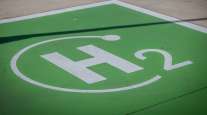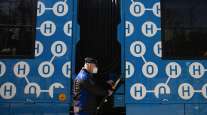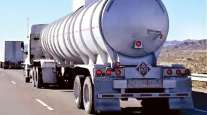Contributing Writer
Deployment of Hydrogen Fuel Cell-Powered Trucks Will Require Fueling Networks, Clear Business Cases
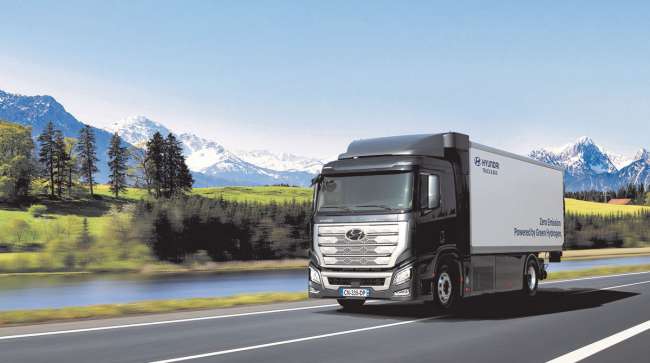
[Stay on top of transportation news: Get TTNews in your inbox.]
A hydrogen-powered commercial truck built by Hyundai was set to begin hauling groceries in Switzerland in April, representing the first of 1,600 fuel cell electric trucks that the manufacturer plans to put on highways in the Alpine nation by 2025.
While fuel cell truck tests also are underway in the United States and elsewhere, these early trips in Switzerland are the initial steps toward the creation of a hydrogen-fueled highway delivery network built on a clear business case.
Switzerland levies a performance-related fee on heavy vehicles based on weight, emissions and distance driven on public roads within the country that works out to roughly $1 per kilometer traveled. Green vehicles, however, are exempt. That gives Hyundai’s venture the headroom to create a sustainable business as it hauls freight for Coop and Migros, Switzerland’s two largest retailers.
Advocates long have pitched hydrogen fuel cell technology as green transport. It was the technology that was always just around the corner but never quite here as companies dabbled in it but could never figure out a commercialization plan.
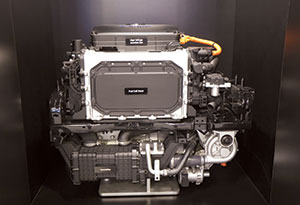
The Hyundai hydrogen-powered fuel cell for the HDC-6 Neptune tractor and trailer at a trade show. (John Sommers II for Transport Topics)
To be sure, there are still obstacles, mainly fueling infrastructure and the high cost of the trucks compared with their tried and true diesel counterparts. But the combination of expected bans on the use of diesel transport in many regions, government incentives and technological advances now could make fuel cell commercial vehicles a legitimate transport option.
Hyundai is far from alone in its pursuit of hydrogen-powered trucking.
Toyota, the world’s most valuable automaker, and industry giants Kenworth Truck Co. and UPS Inc. all are investing in fuel cell truck technology. Nikola Motor Co. and other startups also are entering the field.
Although timetables are likely to slip as companies adjust to the disruption created by the COVID-19 pandemic, multiple initiatives are moving forward.
Toyota has rebuilt two Kenworth truck gliders with fuel cell stacks and other components from its small Mirai passenger sedan to create testbeds. The automaker is using the trucks to move supplies from Southern California’s ports of Long Beach and Los Angeles across the region.
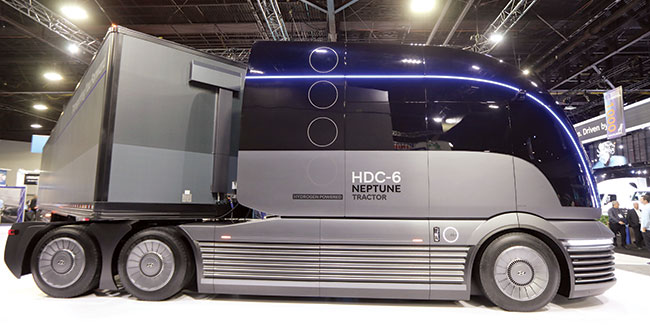
Hyundai's HDC-6 Neptune concept truck. (John Sommers II for Transport Topics)
Now Toyota is working with Kenworth to retrofit 10 T680 gliders as fuel cell vehicles at its technical center in Gardena, Calif. Funding comes from a $41 million Zero- and Near-Zero Emission Freight Facilities Project grant awarded by the California Air Resources Board.
The trucks, which will have a 300-mile range between fueling, will go to real customers to see how they perform hauling freight through dense Southern California traffic. Toyota Logistics Services will use the first four to move passenger cars from the port complex to dealers. UPS plans to put three in service. Two will go to drayage and shorthaul carrier Total Transportation Services of Compton, Calif., and one to a division of Universal Logistics Holdings, also in Compton.
“The biggest takeaway is that we can do this. It can be a very good zero-emissions solution for the heavy-duty sector,” said James Kast, Toyota’s North American fuel cell business analyst.
Toyota sees a fairly quick route to commercialization for hydrogen fuel cell truck builders. Kast expects to see limited commercial production starting in 2022 and a bigger rollout in the mid-2020s.
“We didn’t do this just to build 10 trucks and stop there,” said Kast, citing a need for 30,000 zero-emission trucks at the port complex. “The demand from the customers and the demand to clean the air is there. We will be part of the solution.”
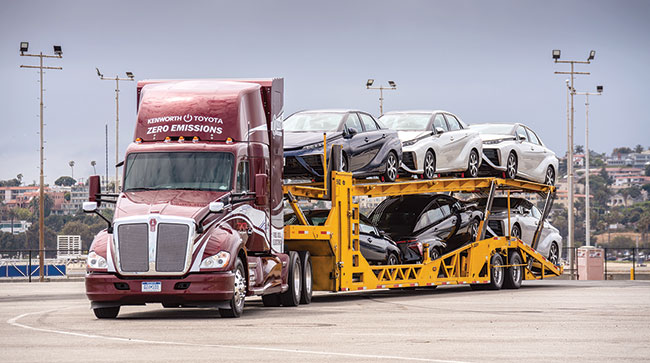
Kenworth Truck Co. and Toyota are partnering on the development of 10 hydrogen-electric trucks to haul freight in Southern California. (David Dewhurst Photography)
Fleet owners are starting to give the technology a serious look.
“Hydrogen is how battery-electric looked about three years before you had the kind of a groundswell we are seeing now,” said James O’Leary, vice president of fleet services at NFI, a for-hire carrier.
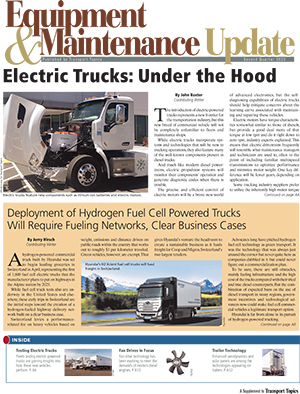
NFI is an early adopter of electric trucks, using Freightliner battery-electric models to run freight between the Southern California ports and distribution centers 50 to 80 miles inland. It plans to convert as much as 40% of its fleet to electric trucks by 2025 and is watching how fuel cell truck technology is developing.
“As a technology, it makes sense and it is a perfect application,” O’Leary said.
It can provide the range and fast-fueling capability of diesel trucks. And it doesn’t carry the weight penalty that comes with hauling heavy batteries in electric trucks.
Other industry players are more circumspect.
UPS will test the Toyota trucks and is running two hydrogen Class 6 delivery trucks out of a facility in Gardena.
It also is having four Class 6 hydrogen delivery vehicles custom-built at Roush CleanTech in Livonia, Mich. The electric powertrain will come from Linamar’s Romulus, Mich., facility and Vancouver, B.C.,-based Ballard Power Systems will produce the hydrogen fuel cell system.
But Michael McDonald, UPS corporate automotive sustainability chief, sees these as tests rather than quick steps to commercialization.
“Though we believe in testing other alternative fuel options, there are always barriers initially,” McDonald said. “For hydrogen, the price of fuel and the availability of reliable infrastructure hinders the technology moving quicker and may also delay it coming to market.”
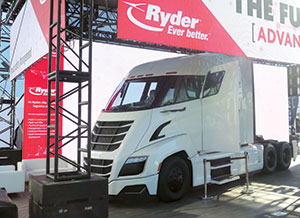
The hydrogen-electric Nikola Two heavy-duty tractor on display at the Ryder System exhibit at the CES 2020 technology show in Las Vegas. (Seth Clevenger/Transport Topics)
Companies can build trucks, but they are not of much use without a hydrogen fueling network. Likewise, companies can build hydrogen stations, but unless there are trucks, there will be no customers.
Nikola is a Phoenix-based startup that has a plan to break through that barrier.
“We are building both the chicken and the egg here,” said Mark Russell, Nikola’s president.
The company will offer the fuel cell trucks on a per-mile basis. Customers will sign all-inclusive 7-year leases now pegged at 100,000 miles a year, but Nikola may lower the miles threshold. It’s a take or pay lease. Customers who fall short on use still must make the minimum miles payment, Russell said. That provides the revenue stream Nikola needs to build out a network of filling stations.
Russell didn’t quote a price, but he said the leases will match the total cost of ownership for a comparable diesel truck.
Nikola’s trucks won’t operate nationwide at the start. Instead, they will run in city pairs, not unlike a dedicated lane contract. The first 400 to 2,000 trucks will be delivered to customers for use on a Los Angeles and Phoenix city pair, running mostly along Interstate 10, Russell said. Nikola will place filling stations along the route.
It’s all based on the commitments we get for a specific lane,” Russell said. “Think of it as a Lego approach building one segment piece at a time. It will be Phoenix to Los Angeles and then Los Angeles to San Francisco and then on to Reno, etc.”

Much of the trucking industry relies on older onboard technology for critical functions, which can hurt reliability and efficiency. So is it time for fleets and their technology vendors to implement faster replacement cycles for onboard tech? Seth Clevenger talks to Ray Greer of Omnitracs and Deryk Powell of Velociti. Hear a snippet, above, and get the full program by going to RoadSigns.TTNews.com.
Nikola already is testing the Nikola Two, a fuel-cell day cab model, and hopes to have the first vehicles in pilot programs at customer fleets by the end of 2022. It will then launch commercial production. Nikola’s business partners and investors include truck maker Iveco, Bosch, Hanwha Group, Wabco and NEL Hydrogen.
But for now, the hydrogen highway starts in Switzerland.
It makes an ideal testbed for fuel cell truck commercialization, said Florian Büngener, Hyundai’s European spokesman.
Switzerland is compact. It has tons of hydro-energy to make renewable hydrogen. The road taxes for commercial vehicles are high but green vehicles are exempt. While mountainous, the ascents are of a size that won’t tax the new technology. And the routes will demonstrate the viability of the trucks for other markets.
Hyundai’s plan is to have 50 of its H2 Xcient fuel cell trucks in operation this year through Hyundai Hydrogen Mobility, a joint venture with H2Energ, a Swiss hydrogen engineering and environmental technology development company. The venture plans to be operating about 1,300 trucks within three years, with an additional 300 trucks to hit the roads by 2025.
The venture figures it will cost $1 million to $1.5 million to build each hydrogen filling station, Büngener said. But since they will be servicing commercial vehicles, it only takes 15 trucks to get the station to make a profit. It would take the constant use of 700 passenger cars to reach the same point, he said. Hyundai’s partners — Hydrospider and H2Energy — plan to build 100 to 150 filling stations.
“We can set up the infrastructure quite quickly without too many risks,” Büngener said.
The truck will carry typical heavy-duty loads and will have a range of about 250 miles. Hyundai has utilized two of the 95-kilowatt fuel-cell stacks developed for the Nexo SUV as the powerplant.
The pay-per-use model makes the most sense for introducing the new technology by removing any risk for the customer, Büngener said.
“We take care that the whole system works. If a truck is broken we will provide another one,” he said.
Norway looks like the next best business case because of its taxes on diesel, Büngener said. Sweden is another potential hydrogen trucking region.
Hyundai also showcased its fuel cell technology in the United States during the 2019 North American Commercial Vehicle Show in Atlanta, where the company introduced its HDC-6 Neptune concept tractor.
Hyundai wants to get its fuel cell vehicles in operation in Switzerland as quickly as possible to prove that hydrogen-powered trucks are practical.
“It is important for us that the trucks are running,” he said. “We can’t let the retailers park them as a showcase to brag how green they are.”
Want more news? Listen to today's daily briefing:


